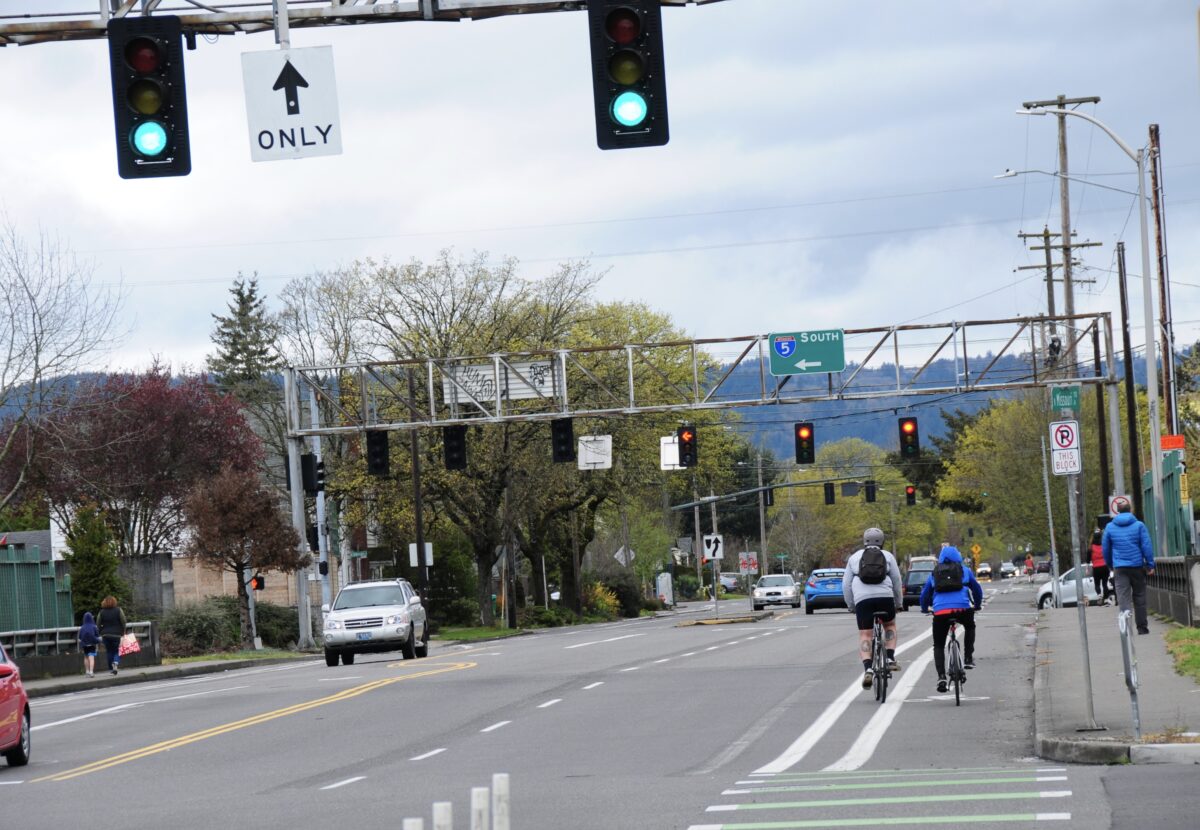
(Photo: J. Maus/BikePortland)
As much as the coronavirus scares me, the long-term implications for transportation frighten me more.
— By Contributor Catie Gould
The last time I took public transit was the last day of my pre-coronavirus life.
On March 10th I took the MAX downtown for a meeting. Afterwards I had a couple beers with friends, and sometime between ten and eleven I re-boarded the MAX to go home. At the platform a man struck up a conversation and talked with me all the way to my stop. He claimed he had recently been in Seattle where he’d been infected by and recovered from Covid-19. He said he felt fine now, but I noticed his cough. I made a beeline for the shower as soon as I got home.
In retelling this story to family and friends, one question kept coming up: What was I doing on public transit in the first place?
As much as the coronavirus scares me, the long-term implications for transportation frighten me more. We have two major issues ahead of us: How do we keep transit operators and passengers safe, and what do we do if most people never come back to transit at all?
Early indicators from China are not promising
China is way ahead of us in returning to “normal” and as of March, traffic volumes there have rebounded to higher levels than the previous year.
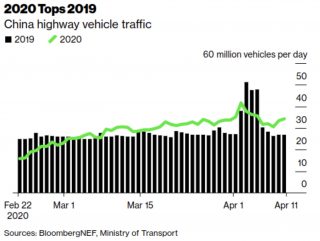
While it appears that people are still not traveling for holidays, on April 11th highways carried 27% more vehicles than the year before.
A study of subway systems in seven Chinese cities published in mid-March reported that of people using the subway and public transportation before the pandemic, only 34% had resumed doing so while 40% switched to motor vehicles (private cars, taxis, and online car bookings) to travel. In Hangzhou, a provincial capital city of 10 Million people, a survey at the end of March found the municipal bus system had recovered 50%-60% of regular ridership.
While it’s too early to tell if these trends will be consistent across countries, the implications of a similar mode shift in Portland would be staggering. In 2018 43,800 Portland residents — or about 12% of all commuters — took public transit as their primary mode according to the American Community Survey. If 40% of them switched to taking cars, that would be an increase of 17,520 additional car commutes. That would be the largest one year increase in car commuting since 1990 and 50% higher than the previous record set in 2018. (This is perhaps an optimistic view that everyone will eventually have a workplace to go back to, and the economy quickly rebounds into its pre-pandemic roar.)
Regardless of exactly where we land, the flight from public transit will be significant and we need to plan for it.
Catch the bus, not the virus
Concerns about catching the virus on transit are very real.
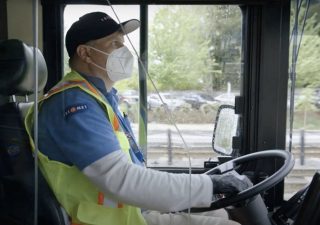
In New York City, transit operators have died at higher rates than police and firefighters combined. By May 1st, deaths had tripled to 98 Metropolitan Transit Authority employees. Out of 78,000 employees 2,000 have tested positive and more than 4,000 are quarantined at home. Transit operators, like the passengers they serve, are more likely to be from minority populations who are disproportionately killed by the virus.
Even Jeffrey Tumlin, a hero on transportation twitter and new Director of San Francisco Muni, urged people to stay off public transit. In early April he temporarily suspended 70 bus lines, allowing 40% of the workforce to stay home in early April. Some lines have returned since, but a 30-cent fare hike was also approved to go into effect in July in an effort to balance a sinking budget.
At home in Portland, Trimet has been criticized by its union for its slow speed in distributing protective equipment and adequate sanitizer to drivers. On April 5th they limited buses to a maximum capacity of 10-15 people and cut service on many lines. Boardings have dropped roughly 70% since February.
Transit’s white flight
A survey by Transit App, shows that in the US the flight from public transit has been disproportionately white, male, and affluent. Of those left riding transit 92% are essential workers, 70% make less than $50,000 per year, and 85% do not have a car at home and do not have access to one.
Here’s how Transit App summarized the survey:
“… the amount of ‘white flight’ risks making public transit more marginalized than it already is. When things settle down, and when more people begin to return to public transit, we’re all going to have to ask ourselves some tough questions about how our transportation dollars are allocated. Our society’s dependence on good public transit has never been so obvious.”
Fighting the car culture war
“Many… are buying cars to reduce their use of public transit or shared transportation to avoid the chance of contracting the virus.”
— AutoNation CEO in the New York Times
While transit agencies make painful cuts and struggle with infection control, automakers are likely hard at work developing ad campaigns that cling onto some peoples’ feeling that cars are the safest way to travel. According to a recent survey by Cars.com, 20% of people searching for a car said they don’t own one and had been using public transit or ride hailing.
To combat the marketing onslaught, people will need good and safe options. TriMet will need to invest heavily and publicly in infection control like accelerating installation of protective barriers for drivers, reprogramming rear doors to open for boarding, and eliminating fare inspections. New strategies like temperature checks or voluntary location tracing apps to aid contact tracers might become necessary to prevent a new surge of cases as some industries head back to work this summer.
One thing is clear; as car users return, they’ll bring a trail of destruction in their wake, further affecting public health with their toxic emissions, violent crashes and other negative externalities we’ve enjoyed a slight reprieve from.
Even if people get back on transit, challenges remain
Even if Portlanders do flock back to transit, there might not be room for them. Buses that could previously carry up to sixty passengers are now capped at fifteen. According to TriMet spokesperson Roberta Altstadt, unless the Oregon Health Authority changes its physical distancing guidelines, those restrictions are here to stay. TriMet is planning for multiple re-opening scenarios, but adding capacity back to the system through schedule changes alone will be difficult.
New and improved bike lanes and the impending rollout of dockless e-bikes this summer could fill the transportation gap, provided that the Portland Bureau of Transportation can work one step ahead of a large-scale re-opening. The Slow Streets Safe Streets initiative is one small step in that direction.
As local leaders move mountains of funding into economic recovery, preventing gridlock and a flight from transit could be a uniting goal. To be successful, decision makers must center the needs of transit dependent workers and prioritize active transportation with an urgency, vision and tenacity we have yet to see. Time will tell if we moved fast and far enough.
Further reading: The Rebound — How Covid-19 could lead to worse traffic by Will Barbour on Medium (4/29/20)
— Catie Gould, @Citizen_Cate on Twitter
— Get our headlines delivered to your inbox.
— Support this independent community media outlet with a one-time contribution or monthly subscription.



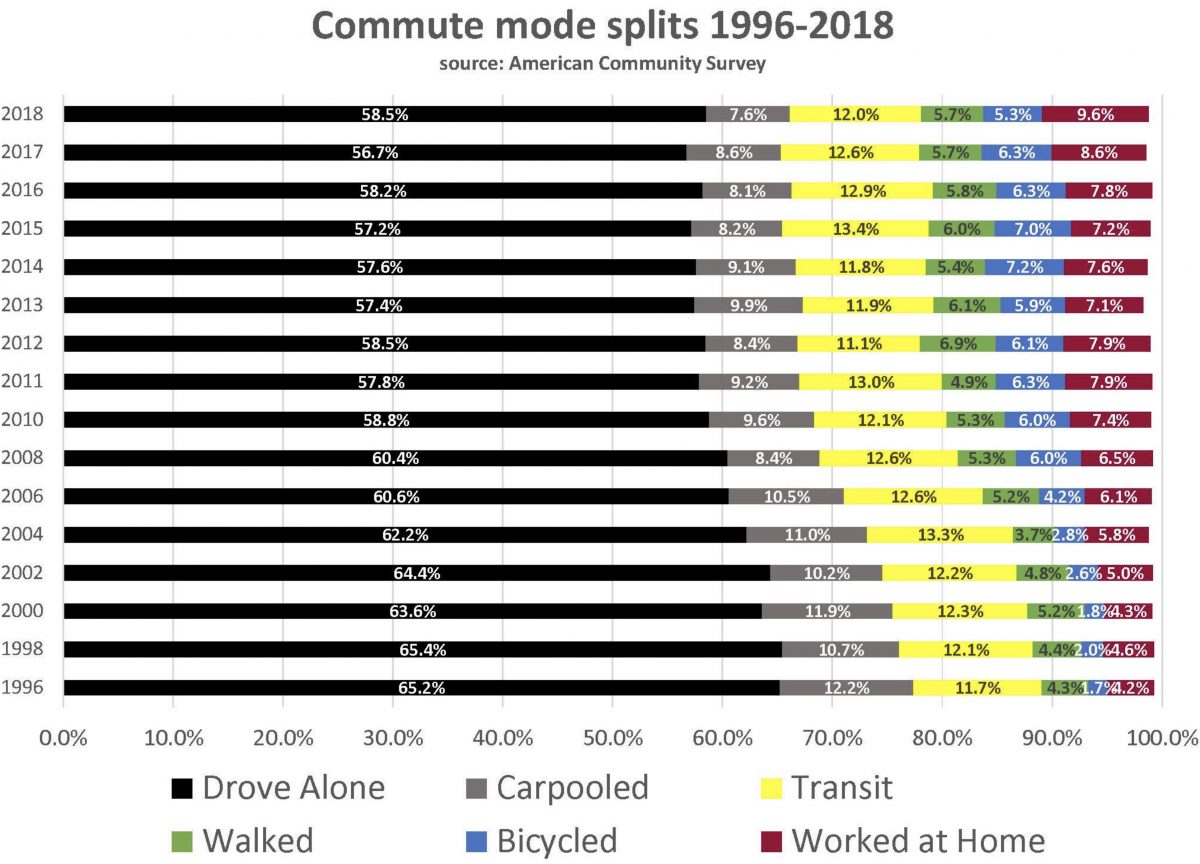
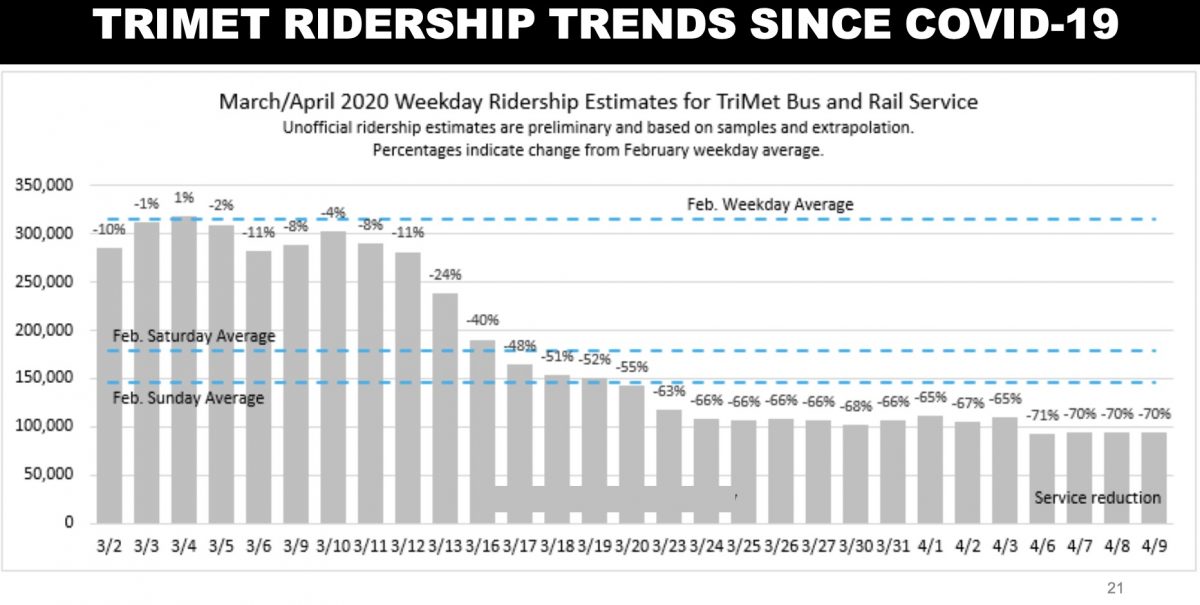
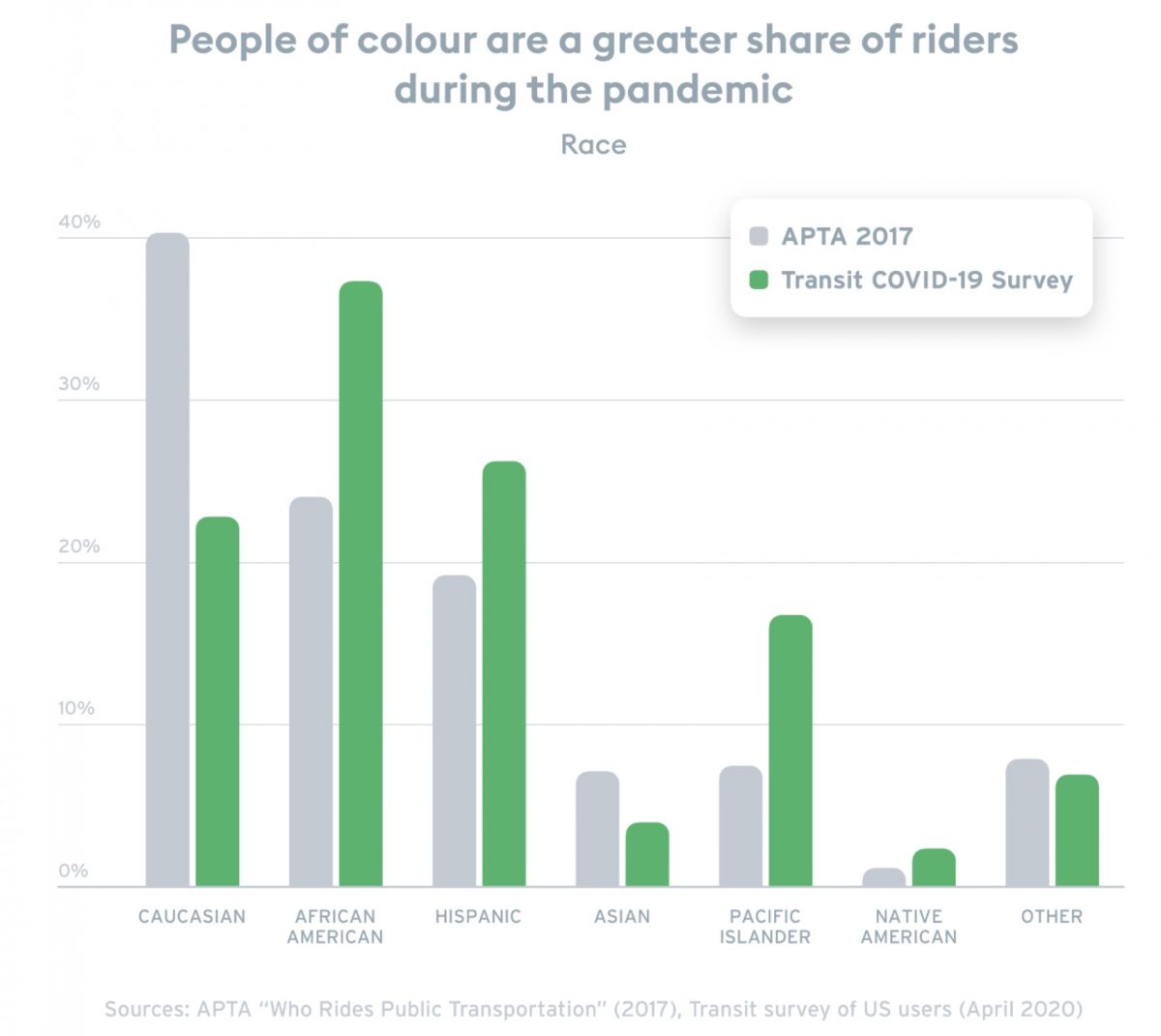

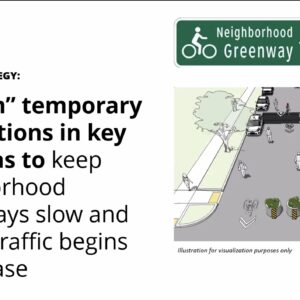
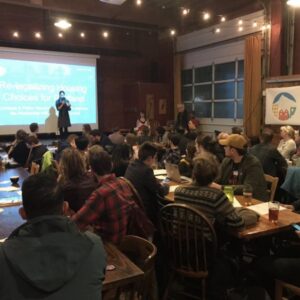
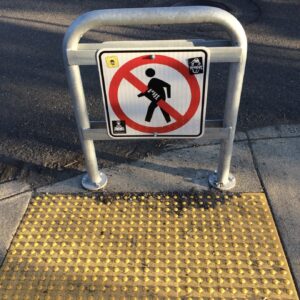
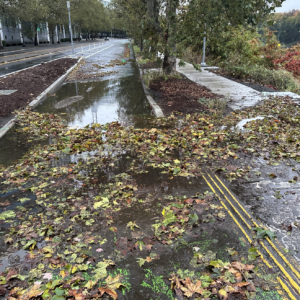
Thanks for reading.
BikePortland has served this community with independent community journalism since 2005. We rely on subscriptions from readers like you to survive. Your financial support is vital in keeping this valuable resource alive and well.
Please subscribe today to strengthen and expand our work.
from a comment I posted here nine years ago:
“I highly recommend (again) the book The Greening of Urban Transport to anyone interested in these issues. Or any others by Rodney Tolley, for that matter. The books’ gone through several editions, and a newer tome has come along since the 1997 title above. The take away message I got from the book is that biking and walking are far closer substitutes for the spontaneous mobility promised by the car than is mass transit, notwithstanding the fact that for decades many of us have championed mass transit. My one sentence summary does not do justice to the great book(s).”
from here: https://bikeportland.org/2011/04/11/bikes-cars-trains-whats-the-best-value-for-taxpayers-51162
Maybe Jonathan will loan you his copy, if he still has it.
You would like the book, Catie.
I’d be happy to loan you my copy if Jonathan can’t find his,
I have two comments.
1. Bike activist really need to focus on how cheap it is to build bike infrastructure. And really, bike infrastructure is just people infrastructure because you aren’t going to find a place it’s safe to bike that isn’t safe to walk/scoot.
2. It would be interesting to see that data nationally. The subsidized price of gas plays a big part, but it seems like nationally, city DOTs always go for the inefficient mode of light rail to move people. Other countries prioritize commuter rail, which works.
Despite their self-congratulations, TriMet has squandered billions of dollars in the last twenty years. Their love affair with choo choo trains has left us with an inflexible, expensive and most importantly SLOW system. We can’t expect people to move over to transit or bikes when those modes are less safe, less comfortable, and slower than taking their car.
TriMet/PBOT needs to stop catering to motorist and NIMBY home owners.
People think they have a right to fast transportation. They do not.
People think they have a lot of rights they do not.
And TriMet’s love of diesel buses has left us with polluted air.
It is plain that neither an auto based or mass transit based system will really solve the problem in a Corona influenced future. Most of our commuting is nonsensical when you look at it through a strictly logical framework. To deal with energy, pollution, congestion and disease aspects of our future we must decentralize workplaces, and come up with a way for people to live near where they work. This was obvious for the thousands of years of human history before the automobile, and will be the norm for the rest of history after the automobile is gone. Don’t let the real estate industry, our current school system and social paradigms from 50 years of pop culture get in our way. Live in a place where you can walk or bike to work and school, that is connected to other walkable locations by longer distance trains equipped with seating compartments ( as trains have had for 150 years) . The Coronavirus is drawing the curtain on our current set of living arrangements and it is time to move on.
We tried this before. Remember 1900? Disease and horse manure everywhere, a horse and safety bicycle in every garage, and predictions that by the year 2000 there would be 30 feet of it added everywhere in the USA based on present trends. The NYC subway was originally a private endeavor in response to all the manure and disease, the packed streets of everyone moving every which way without rules. Now it’s 120 years into the future, same fear of disease, the same old s..t
This point of view doesn’t account for frequent job changes in today’s economy. We live in the burbs, in a house we bought in 1996 because it was near my work. Nearly 25 years later, we’re still in the same house, where we stayed because our kids were rooted in their schools and neighborhoods. Since then, my husband and I have held multiple jobs, a stint in further education, and then more job changes. If we’d moved with every one, our kids would have moved around like Army brats–costly to their educations and emotional health. And costly for us buying/selling houses every few years. I don’t know how to balance the reality of the economy with the cost of moving/buying/selling houses, but it is real.
I work on the frontlines at TriMet and I guarantee we’re never coming back from this. All of our choice riders are fleeing due to heath concerns, service cuts and quality issues. What I am seeing is simply an acceleration of trends prior to COVID-19 , our system is stuck in a death spiral as quality continues to erode. It is simply not safe to ride with the pandemic pushing choice riders out we are seeing far more undesirable behavior. Couple this with a ravenous inclination among (non-transit riding) Portlanders to virtue signal though supporting lax fare and code enforcement and we have an existential crisis.
Say what you will but we can’t have it both ways: lawless rolling homeless shelters or transit you actually want to use.
That is troubling to hear. I wonder if there is a silver lining (one that Ivan Illich would recognize)?
If climate change is going to force us to quit the fossil fuel habit (which if we are honest includes mass transit, even electrified mass transit) then perhaps this is the kick we need to refocus our energies on human powered transport?
#rollerblades
#feet
#bikes
#rikshas
#oxen?
Yes! The silver lining to this is it’ll be MUCH easier and cheaper to build massive amounts of bike infra than transit infra, which, combined with e-bikes, will get many people out of their cars, which will set transit up for an eventual comeback
I don’t think oxen labor is climate friendly.
If there is a silver lining, it’s for metro areas like Portland’s that have built out a lot of rail infrastructure. Rail requires vastly more capital expenditure than bus transit (even compared with BRT, it’s at least an order of magnitude more), but is cheaper to operate. So I would expect the MAX trains to keep running, perhaps at lower frequency, even if the bus network shrinks to a fraction of its current strength.
Smaller and/or less progressive cities, where transit is more marginal, may lose it completely or see it dwindle to a couple of the busiest routes.
Alright, I’ll bite. What is a “choice” rider?
I think “a rider who chooses to use transit” is what they meant.
I thought it was a particularly good rider, kind of like a choice steak.
I’ve long been mostly a “choice rider.” I could have easily driven to work on the westside when I lived in Portland, but chose to bike+MAX most days instead. Since moving, when I’m in the Portland area for work there, I almost never rent a car and instead use a combination of TriMet and the bike I keep there. At home here in Minneapolis, my transit use is also entirely elective.
And I’m even more concerned about transit here than in the Portland area. There are a lot fewer “choice riders” here, except for the masses of suburbanites who ride the freeway express buses in from far-flung suburbs into downtown (which has several times the job base of downtown Portland).
Most local routes are overwhelmingly ridden by “captive riders”, which has struck me as odd because the bus system here is actually pretty excellent. But people with enough money to drive (especially white people with money) almost never ride. My friends give me strange looks when I mention having ridden the bus, or the fact that I actually know much of the route network and timings. That phenomenon, combined with Minneapolis being a lot less white than Portland, means I am very often the only white person on the bus. Which doesn’t make me uncomfortable personally, except the sadness in realizing that the fantastic bus system here is still mostly a program for poor people – and politically is seen as such. This is vastly more true here than with the TriMet system. It will be interesting to see if it remains viewed that way after the crisis.
People who can afford to drive to work and park every day, but choose transit for other reasons (time, environment, multi-tasking, etc). These are generally white collar workers, mostly downtown.
This is the definition used by most US DOTs: A ‘choice rider’ is one who has other options that just public transit to get around. A ‘captured rider’ is someone who is without a car driver’s license nor has access to a private vehicle, including people who live in areas without any public transit (most of the USA). Technically anyone who is without a driver’s license is defined as a ‘captured rider’, even someone who basically bikes or walks everywhere by choice and never uses transit. In most US cities, most ‘captured’ riders are poor and/or black; most ‘choice’ riders are white or Asian.
I was a choice rider back about 20 years ago. I lived on Hawthorne, but worked in Tualatin. I took the bus 1 hour each way, because it was the ‘right’ thing to do. I had a good car and was a life-long bike commuter in Eugene before that, but commuting in Portland was just too dangerous, and sweaty for me every day. I made it work, because my fellow bus commuters were a congenial lot, and I like to read.
Have you seen the pictures of the New York subways with the homeless using the trains to sleep in? When the homeless fans make Tri Met free for the homeless, that will be our future. Then any and all choice riders will leave permanently. I almost never ride now because of the homeless.
Calling people “homeless fans” seems unnecessarily insulting and argumentative. An only slightly veiled form of name-calling.
I don’t agree with any hostility towards the homeless or your characterization of “homeless fans,” but prior to the pandemic, for the last year or so that had become a serious problem on our Metro trains here in the Twin Cities, far more than I ever saw on the MAX. Sometimes there would be so many people sleeping on the trains that few seats would be left over for other riders. Can’t say how it’s been the last two months though.
I wish we could agree to suspend use of the phrase “virtue signal”, since it seems mostly like a lazy way to undermine and belittle someone with whom one disagrees. It serves as kind of a sneak attack on a person’s character and integrity by stating as fact the knee-jerk assumption of a petty, selfish motive for their position while that in fact may not be the case.
I’ll join you if we can add “dog whistle” and “NIMBY” to the list.
Sure thing.
Really I guess my thinking is that if I wanted to use any of those phrases, then it would be incumbent on me to back up my assertion and explain why I think the person I’m referring to is “virtue signaling” or “dog whistling”. In the absence of an explanation, it just looks like a convenient way to dismiss someone offhand.
Wow, this up/down voting thing sure adds a strange wrinkle to these comments. Gives me the creeps, somehow.
Panther, “virtue signal” is simply faster to say than It’s equivalent definition: “the practice of sharing of one’s point of view on a social or political issue, often on social media, in order to garner praise or acknowledgment of one’s righteousness from others who share that point of view, or to passively rebuke”.
And to those who continuously proclaim how Sad homeless is, why not volunteer to host a camp in front of your house or business?
**crickets**
There’s an overabundance of well meaning Portlanders with big hearts but little first-hand exposure to the real costs and damage wrought by chronic homelessness aside from a certain queasiness as you pass them on the road.
Kittens, thanks but my issue with the term is not that I don’t know what it means. I take issue with the very often unfair characterization that a person’s motivation is “to garner praise or acknowledgment of one’s righteousness”. Applying that term sidesteps the actual discussion at hand and instead takes a swipe the other participant’s character.
And I agree with Hello Kitty above that there are certainly other phrases that can be wielded this way. I think terms like this amount to an accusation of sorts and therefore they should be accompanied by some explanation. Without saying “here’s why I think you’re virtue signaling/dog whistling/whatever”, it’s nothing more than an unsupported personal insult.
If your position is that many Portlanders are well-intentioned but ignorant with respect to issues of homelessness, then is it possible that they simply believe the opinions they’re expressing, and that maybe those opinions really don’t originate from an overpowering need for approval – and that you just happen to disagree?
The current form of virtue signalling that I detest most is well-off Portlanders attending public meetings and holding up signs saying “Sweeps kill!” That’s the laziest rhetoric imaginable: take anything you don’t like and put the word “kill” (or “kills”) after it. “Taxes kill.” “Nickelback kills.” “Broccoli kills.”
I know that the situation of homeless people is dire, but this type of rhetoric demeans the things that actually kill, such as speeding motor vehicles.
Not only are cars the safe from Covid, gas is 1960’s level price.
I think we are doomed when this ends. Driving will explode with the cheapest gas adjusted
for inflation in 30 years. And it is not going to get expensive any time soon.
Major glut.
All the models from the 1990’s about oil reserves are wrong. There is huge amounts to be had with fracking.
Climate change is inevitable. Sorry.
The only way to make driving not attractive are $5 gas taxes ala Europe.
Not going to happen here. The US is now the major oil producer, as recent events have shown, we will not kill the golden goose, not now, probably not ever. Texas is a major player for national politics in this country, more so than ever in the future.
Good luck shutting that economy down, even if Bernie Sanders was President.
Portland’s gas tax is up for renewal this year. It will be interesting to see if all this has any impact on voter’s support of it.
Exactly. The horse has left the stable. It would be best to prepare for the impacts rather than trying to prevent the inevitable.
Well, “preparing for the impacts” might include making a lot of the changes in the last two months semi-permanent, since climate change is likely to bring us a whole lot more pandemics and outright plagues. Not sure how we prepare for the resource-driven wars that are coming, though.
Agree that we need to prepare for the impacts, but throwing up our hands and saying “Nothing can be done” is the ultimate form of laziness and nihilism. The choices we make today can have – and do have! – an impact on the future.
Portland with all the bars, hookah lounges and pubs closed permanently. No Lucky Lab. All restaurants have sterile social distancing seating – thriving McDonald’s and dead local bistros. Whole Foods will start to look like WINCO. Everyone driving their cars everywhere. Soon Weird Portland will no longer be a small San Francisco and instead will start to resemble are large sanitized Peoria – boring.
Winco cares more about its customers and local employees than Whole Foods, so maybe we should hope Whole Foods starts to look like Winco.
We were well on the way to Peoria long before covid. Too many have been seduced by the siren song of redevelopment.
It’s such an unfortunate situation all around, because no matter how we slice I don’t see any way that single-occupancy vehicle use doesn’t explode in the coming months…. There’s plenty of people out there that can’t bike to work (by virtue of no infrastructure, disability, or whatever), and that will feel uncomfortable on transit, leaving them no other option.
I do wish we’d take the step of banning private sales of oversized trucks that destroy our roads and can kill people with ease. If someone really needs a truck for a day, they can rent one from a company. Without these, the thought of a car-dominated few years would be little more palpable…
Perhaps we should invest heavily in carpool lanes as well (e.g. ban vehicles with less than two occupants on the Hawthorne Bridge). If everyone carpooled, we’d have half as many cars on the road, which would certainly be a huge improvement over the current state of affairs.
Carpooling was feasible when many people worked the same schedule in an area of concentrated employment (ie., downtown) and their kids went to neighborhood schools. With flexible schedules, employment increasingly decentralized, and the need to schlep kids to schools all over town at very specific times, carpooling was already dead.
Very few friends have close enough schedules anymore to carpool, and virus fears will absolutely kill any interest in carpooling with strangers.
I’ve taken N. Rodney a few times recently; after lambasting it on multiple occasions over the years.
It’s pretty, and almost useful since there’s no traffic. But until those stop signs are fixed, it’ll still be as useful as hip pockets on a hog when the traffic returns.
It seems I will probably be back to bike all the way to work (over the west hills) or drive when things do open back up. Though that was pretty typical for the summer months.
Then again, MAX for a few stops is probably the best case scenario in terms of transit. Imagine, you might even get a bike hook getting on at Goose Hollow.
Rolling over the west hills was my commute a few years ago and on mornings I didn’t want to tackle the hill, I’d try to time the MAX to get a Red Line – where I’d find a hook and a seat every time. I don’t know if that’s still true, but expect it will be when things open back up. The Blue Line was ALWAYS packed as it goes so much further west, but hopefully you can make the most of your commute ride from Sunset TC or Beaverton TC.
I didn’t have too much trouble finding a MAX hook most mornings, but evenings were always a lot more crowded. My usual mode was bike-to-MAX out to the westside in the morning, then bike all the way back to Portland in the evening.
”New and improved bike lanes and the impending rollout of dockless e-bikes this summer could fill the transportation gap, provided that the Portland Bureau of Transportation can work one step ahead of a large-scale re-opening. The Slow Streets Safe Streets initiative is one small step in that direction.“
So you’re saying that bikes can fill the gap? Do you know what the actually gap
Is and how many more bikes we would need? You’re also counting on a pay as you go bike program to fill a void? I wonder what the sanitizing situation with bike sharing operators? I do see an increase in bike usage but I highly doubt that the 45 people per bus will somehow think that biking is better than driving. Biking for me won’t change much but let’s be honest, Ford is offering 6 months of zero payments and 5 years at 0% APR. I also think that the time is ripe for people to stand up against the clueless and deaf project managers at PBOT. Yep. Clueless.
Auto use will also expand because of increased reliance on the gig economy that gives workers fewer hours and requires them to pick up additional work wherever they can find it. Can you imagine that can be accomplished without driving to most of them? Many workers who find good, semi-permanent, full-time jobs will not be working where they did previously. The new job will likely be more distant resulting in more driving.
On the other hand, we have learned that a substantial number of office workers and professionals working in the knowledge-based sectors can work from home. These workers are probably more highly paid, have more discretionary income, and more flexible schedules. It’s hard to guess how that combination will impact their transportation choices. Maybe fewer peak hour work trips and more during other times.
The honeymoon is over in Bend. I noticed that, starting Monday, traffic was up maybe 20% from last week. Still, well below pre-CORVO levels, but the direction is clear. The worst traffic in Bend, which is still a small city, is during ‘school-commute’ hours. Many parents drive their kids to school (you see very few walkers or riders), and many drive across town 4 or 5 miles twice a day, because school choice is rampant. If this one source of traffic was significantly curtailed, by stopping cross-town school transfers, and giving incentive to not drive (lose your free lunch?), traffic is Bend would be tolerable. I am well against the grain on this one, I know; especially with parents.
Don’t worry, Bends traffic will fade again soon. Bend has become a town built on tourism, retirees and the growth and construction industry. It was hammered in to the ground economically in 2001, and 2008 and this time will be much worse because recovery will be much slower if at all.
Might be a nice place for a second home!
I could totally see retiring there.
I agree, once it gets back to the Bend of about 1979 it will be great, getting there after the end of happy motoring and air service will be a trick.
Luckily that is a few decades out, at the earliest.
Decades, as long as some series of events that we might have foreseen but did not invest adequate resources to prepare for does not occur in a time of feckless leadership, causing fear and grief while decimating the economy, in a matter of months.
Today and every other day there’s scheduled bus service to Bend. They bump up to larger buses if reservations show demand.
Mistake. Currently 2 days a week.
The school situation is a tough one. Parents feel compelled to send their kids to a school of their choice not only so they can get the best fit to make their kids “competitive in the global economy” (I have heard that exact phrase a LOT from fellow parents, in both Portland and Minneapolis), but also because if your kid has even the slightest special need, neighborhood schools will try to push you out to a magnet school. In the pre-choice era, neighborhood schools took all comers and dealt with them. Not true anymore.
Part of the problem, too, is the current Common Core standard that is accelerated about a grade and a half above what I had as a kid, which means they’re trying to teach kids stuff that in many cases isn’t age-appropriate, leaving a lot of kids behind. If we eased up and allowed more diversity in our schools’ students and achievement levels (maybe even relaxed the Prussian grade system), neighborhood schools could work for a lot more people.
All this is too bad, because I agree that the amount of traffic and climate impact generated by the school choice system (which was, sorry, first popularized right here in Minnesota) is staggering.
(Full disclosure: one of my kids has special needs and goes to a school across town that has worked out fantastically. My other child is more mainstreamable, and attends our neighborhood school. So I’ve got my feet on both sides of the fence here).
Call me alliterate, but….
Pondering Portland’s Post-Pandemic Portage
Agreed, driving and biking will both see increases, at the expense of transit. I see bike sales are way up (even though car sales are down) … hopefully even as we ease into our new normal biking may remain more popular than before. I would also expect e-bikes to take off even more than they have the last couple years, as former “choice riders” (and captive riders) of transit look for alternatives.
It is a massive setback for transit systems worldwide, that’s for sure. Which saddens me, because I foresee a lot of bad news coming. Not only will fare revenues indefinitely remain much lower than before the pandemic, but other sources of transit funding may dry up as governments tighten their budgets and pressure increases to cut transit funding. And there are plenty of people eager to apply that pressure, with groups like Americans for Prosperity, the oil, automotive and many automobile-dependent businesses champing at the bit to stick a fork in transit. They’ll step up their attacks on bikes again once they’ve accomplished that.
A lot of hate on here for the Max and dire predictions about the buses. The logic for an increase in driving does seem compelling. However I’m going to do what ever the opposite of virtue signal is and say I’ve been riding the Max a lot recently as I can’t stand the road rage and stupid crap on the roads in East Portland. I get the sense commenters here aren’t frequent users of the system. You still have to pay to get on the buses so they aren’t full of homeless and never were. The Max which is essentially fareless due to lack of enforcement, does have issues with idiots fighting each other and being loud but its not that bad. Most of the riders are “regular” looking people. But I classify black and brown and poor people as regular. People just doing their thing, like everyone else. (Now that’s a virtue signal!)
The issue I don’t see many people talking about here is WHY our modern commuter-based economy is desirable and inevitable. Hasn’t the pandemic shown us that it’s possible for the VAST majority (95%, I’d say) of white-collar workers to work from home and still be productive?
Yet everyone is already talking about going BACK to work, and it’s a just a matter of time before those millions of white-collar workers are all ordered back to work and get in their cars and jam up the roads and foul the air and destroy the planet. Where are the corporations and public agencies with the courage to envision the new work-from-home world? It would save millions in unneeded office infrastructure and slow down the destruction of the earth.
Perhaps even more interestingly, it shows how “essential” these white collar jobs actually are.. Meanwhile, the vast majority of “essential” workers are still being paid like they are replaceable cogs of the machine.
Whether a job has to be done on-site is not connected to how “necessary” it is. And, sadly, retail, warehouse, and other jobs may be “essential”, but those workers are easily replaced, which is why pay and benefits are low. The way to change that is to acquire skills that make you valuable and difficult to replace, or join a union.